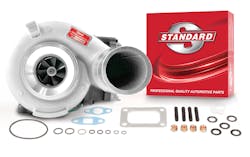Sponsored by Standard®
Turbocharger Opportunities
In an effort to increase fuel efficiency, maintain performance and reduce emissions, vehicle manufacturers are adding turbocharged engines to their lineups at a significant rate. Over the next five years, the turbo service market will continue to experience substantial growth.
What Causes a Turbocharger to Malfunction?
Symptoms of a malfunctioning turbocharger include loss of power, excess smoke (in diesel applications), high fuel consumption, overheating, increased exhaust temperature, and oil leaks from the turbo. Debris or a leak in the ductwork can damage or block the intake or exhaust systems, impacting turbo performance.
A whistling noise under the hood (different from normal turbo spooling) could be caused by a boost leak or inadequate turbo clearances. A rotor assembly that has seized up or is difficult to rotate might be caused by degradation of the oil. Clearances that are out of specification may be associated with a lubricating oil issue.
If the turbo has been damaged by foreign material, there will be clear evidence that on the turbine or compressor housings. Damaged blades indicate that the turbo needs to be replaced. Metal in the intake tubes may indicate a damaged engine.
Common Trouble Codes
Two typical diagnostic trouble codes for turbos include P0299 (underboost) and P0234 (overboost). An underboost code could be due to a wastegate that’s stuck in the open position or a leak between the compressor and throttle. Causes of overboost include a wastegate that’s stuck in the closed position, a wastegate vent solenoid that’s stuck in the vent position, and leaking or disconnected control hoses.
Replacing a Faulty Turbo
If the determination has been made that the turbo is faulty, you’ll need to install a new one. Remember to check for low oil, dirt ingress, and oil contamination with coolant. Ensure that the air ductwork is sealed and perfectly clean, there is proper lubrication and cooling at the turbo, and fresh engine oil is bled through the turbo. A new, quality air filter should be installed on the vehicle.
When selecting a replacement turbocharger, remember that quality matters. Standard® offers a complete line of 100% ALL-NEW (not remanufactured) premium Turbocharger Kits. Standard’s New, No-Core Turbocharger Kits are available for gas, diesel, domestic and import vehicles.
Complete Turbo Kits
Standard® Turbocharger Kits include the hardware and gaskets needed for a complete turbo repair.
Standard® Turbochargers are engineered to ensure each performs with precision for the application it is replacing. As a quality-plus offering, each Standard® new Turbo Kit includes everything needed for installation, including a factory gasket kit and new hardware. Each New Turbocharger is also protected by a 3-year/36,000-mile limited warranty and carries no core charge – no core returns! Standard® also offers a drop-ship program on all Turbocharger Kits to help you get your customer’s vehicle back on the road quickly.
All Standard® Turbos undergo a full spectrum of quality testing including burst test validation, on-vehicle performance and 100% end-of-line testing through the full RPM range. The Standard® Turbo Program also includes Turbo Actuators, Oil Drain Tubes, Wastegate Solenoids, Turbo Boost Sensors, Charge Air Coolers, and more.
For more information on diagnosing and replacing these components, search “Turbo” on the StandardBrand YouTube channel or visit StandardTurbos.com.
